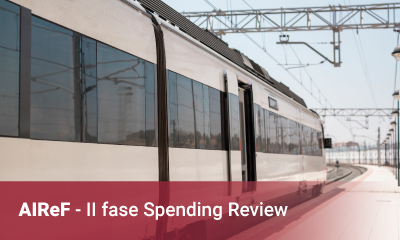Esta web utiliza cookies para que podamos ofrecerte la mejor experiencia de usuario posible. La información de las cookies se almacena en tu navegador y realiza funciones tales como reconocerte cuando vuelves a nuestra web o ayudar a nuestro equipo a comprender qué secciones de la web encuentras más interesantes y útiles.
News

Ivie collaborates with Airef in the review of transport infrastructure investments included in the 2nd phase of the Spending Review
The Institute participates in the analysis of the results of public investments in transport during the period 1995-2018, amounting to a total of 340,000 million euros
The Independent Authority for Fiscal Responsibility (AIReF) has published the reports for the 2nd phase of the public expenditure evaluation known as the Spending Review, a project funded by the European Union, through the European Commission. In these reports, AIReF analyses expenditure items that represent more than 51,000 million euros per year, slightly over 4% of Spain’s GDP level.
The Ivie participated in the evaluation of one of the four areas of this study, namely, investment made in transport infrastructure in Spain between 1985 and 2018. During that period, 340,000 million euros were allocated to transport, with an investment of 7,000 million in 2018.
In addition to transport infrastructure, the 2nd phase of the Spending Review covered three other areas:
- 13 tax benefits in Personal Income Tax, VAT, Corporate Income Tax And Special Taxes, which represent more than 35,000 million a year.
- Hospital expenditure made by the National Health System (NHS) in pharmacy and equipment, representing an annual budget of 7,4000 million.
- 7 incentives for hiring and self-employment, representing an annual outlay of 2,000 million euros
The Spending Review is becoming more common in countries with good economic performance. Moreover, it is the first analysis carried out by an independent body in Spain based on data, empirical evidence and the most successful experiences at national and international level. The objective of this review is not to spend less, but to spend better and make a better use of resources for the benefit of the Spanish population.
Transportation infrastructures
The report carried out by the Ivie focuses on the evolution of investment in transport infrastructure in Spain over the period 1995-2018 and its comparison with main European economies. During that period, Spain made an investment effort (investment/GDP) 42% higher than that of France; almost twice as much as Germany; and 60% more than Italy. However, the report highlights investment differences by periods. For example, a greater effort was made in the expansion years (1995-2007) and also in those of the crisis, but dropped to less than half in the subsequent recovery period (2013-2017). Compared to the rest of the countries analysed, the authors highlight Spain’s deliberately countercyclical policy in the first years of the crisis with investments in road, rail, port and airport infrastructure, but resulting in an increase in public deficit and debt, which soared from 35% in 2007, to 70% in 2011, and sky rocketed to 100.4% in 2014.
In an attempt to contain the deficit, there was an intense and long-lasting fall in investment in transport infrastructure during the recovery period that continues to this day. This sharp decline in Gross Fixed Capital Formation in infrastructure has not allowed to cover the depreciation of the capital accumulated in these assets and, consequently, has reduced the stock of transport infrastructure.
Given the evolution of infrastructure investment, the authors of the document propose several recommendations for infrastructure policies:
- Investment in infrastructure by the Public Administrations should be around 0.5% of GDP to guarantee, at least, the maintenance of the stock.
- The annual gross investment effort in infrastructure in the medium term would have to be maintained at around 0.8-1% of GDP, in order to ensure a balanced evolution of the supply of services with a growing demand.
- The third recommendation is aimed at avoiding an over-effort in investment in three ways: by programming investments based on a rigorous analysis of the needs; selecting projects based on a cost-benefit analyses; and using all available instruments to ensure an efficient management of public contracts.
Beyond investment, the study also analyses transport infrastructure endowments measured in monetary units and concludes that, although Spain remains the country with the lowest total endowments, it has made a significant effort to try to converge with Germany and France, especially in airports, ports and railroads, although not in roads, where greater weaknesses have been detected.
Another aspect analysed in detail is the distribution of capital endowments in transport infrastructure among Spanish regions and provinces. The general conclusion is that the regions located in the northern half of Spain -with the clear exception of Madrid- are relatively better endowed when considering population or activities that takes place in that territory. However, this situation is the opposite when surface area is taken into account. In this case, the territories that are best endowed are precisely Madrid and those located in the periphery, including the two groups of islands.
The report commissioned by the Airef to the Ivie includes a detailed analyses of the physical endowments of infrastructures and their relationship with their monetary value, as well as the economic sustainability and ageing of transport infrastructures. In addition, a whole chapter is dedicated to the analysis of intermodal transport and its evolution, and another to the economic impact of transport infrastructures in Spain. It also considers the accessibility and impact of infrastructures on the territorial and social cohesion of the country and analyses the environmental effects of transport.
A group of experts from the Ivie, coordinated by Ivie’s Director of International Projects, Matilde Mas, participated in the research work needed to prepare this document.


